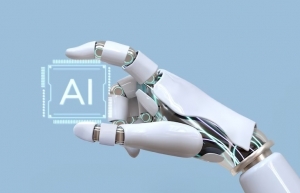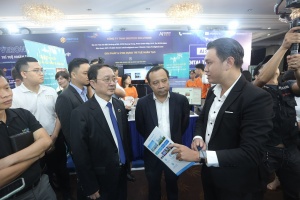The future of banking: Unleashing AI
 |
| Phillip L. Wright, COO of HSBC Vietnam |
On October 1, actor Tom Hanks posted a computer-generated photo of himself on his Instagram to warn his fans about an advertisement using his image without his permission.
He wrote, “BEWARE!! There’s a video out there promoting some dental plan with an AI version of me. I have nothing to do with it.”
This, again, fuels the buzz around AI, highlighting its potential but also its dark side.
Revolutionary. Superpower. Transformative. We've heard such words about AI, especially since the release of ChatGPT. No doubt, the AI hype isn't over yet as it introduces the possibility of levelling the playing field in many industries.
AI and advanced analytics allow vast volumes of data to be assessed at high speed and with greater sophistication than ever before. This is important because data is a transformative asset. It allows organisations to turn information into opportunities, allowing them to serve their customers better. However, this is only possible if the data is managed effectively.
Progress in this space has led to better predictive models and exciting FinTech partnerships, which are helping to deliver personalised services for customers.
The power of AI in banking
AI enables banks to improve the services they provide to customers, and helps them manage their business more efficiently and effectively. How banks analyse data is a great example – they can understand their customers better and personalise how they interact with them, including protecting them from fraud.
| While AI has been a hot topic for several years, most of the focus until recently has been placed on predictive machine learning models. |
At HSBC, we are very aware of the potential risks of AI, so we have established a clear set of AI ethics considerations and principles. Maintaining our customers' trust is of upmost importance. We are focused on ensuring we carefully manage and protect data, are transparent about how we use it, and understand the risks associated with it.
We are already using AI widely to do things like improve customer services and increase the efficiency of our processes.
Examples of how we're using AI at HSBC include scanning for potential signs of financial crime far more effectively and providing institutional investors with a digital service offering that uses purpose-built natural language processing to enrich the way they interact with global markets.
We also created a system, in partnership with Google, that monitors contact centre calls, and checks if call agents have sold a specific product correctly by explaining the terms and conditions in the right way.
We’re using the latest AI and cloud technology to help identify suspicious activity and prevent financial crime in several markets. Our Dynamic Risk Assessment solution analyses and identifies criminal activity, enabling us to spot genuine crimes twice as fast and with much greater accuracy, and generating 60 per cent fewer false cases than previously.
Google Cloud has now launched this anti-money laundering (AML) AI solution – which we co-developed – that could transform how financial crime is tackled across the industry.
Google Cloud's AML AI helped HSBC improve our detection capabilities, deliver more accurate results, and significantly reduce batch processing times for its large customer base. As a result, HSBC was awarded the Celent Model Risk Manager of the Year 2023.
We continue to test how we can apply AI at HSBC, with hundreds of test cases underway. Our key focus is around three major categories, including improving customer products and services, regulatory compliance, and automating operational processes.
AI vs Generative AI
While AI has been a hot topic for several years, most of the focus until recently has been placed on predictive machine learning models.
Over the last year, there has been a surge of interest in, and a staggering improvement in the performance of, so-called generative models. These are machine learning models that can produce new content, something which until recently was considered to be the unique purview of humans.
As DALL-E – which produces images from text – and ChatGPT – which produces text via a chatbot interface – have had a significant influence on the public mindset, the buzz they created has lured more tech companies of all sizes to join the trend, building their own equivalent generative models.
Now anyone who knows how to use a website can start a conversation on almost everything with ChatGPT.
Generative AI models are becoming smart amazingly fast, so there is a rush to figure out where they can be used, along with some big questions about what roles AI should or should not play in the bank. There is the potential for generative AI to have a significant impact on several sectors of the economy.
Banks are often early adopters of new technology. In retail banking and wealth management, generative AI is used mostly to produce synthetic data to train the models behind Know-Your-Customer processes, making them more efficient. The technology can also power natural language models to fine-tune virtual assistants (voicebots or chatbots) to enhance the customer experience.
In wholesale banking, generative AI is likely to speed up back-office tasks like answering performance questions in real time. It may also help train algorithms with scenario analysis under various economic conditions.
Beyond business, generative AI is also adopted in anti-fraud activities, helping to detect anomalous and fraudulent transactions. The top use case for generative AI in banking is the Generative Adversarial Network (GAN) model based on deep machine learning.
As the famous algorithm behind the artificially created painting Edmond de Bellamy, which was sold for $432,500 in 2018, it's a powerful tool for generating artificial datasets that are indistinguishable from real ones.
Therefore, it's used to produce synthetic transactions that will then be compared to the genuine data to develop the sensitivity for GAN to identify anomalous transactions. The more GAN is trained, the better it gets, becoming a significant tool for the financial services sector to deal with fraud thanks to its ability to screen an enormous number of transactions.
To further explore the potential of AI in financial services, HSBC is developing a dedicated innovation team to discover the emerging capabilities of generative AI, synthetic data, and advanced AI models.
We are currently researching the use of generative AI and building a group-wide strategy to implement solutions. 80 potential use cases have been identified to date, and that number is expected to grow.
HSBC is partnering with Big Tech companies to understand their AI platforms, including OpenAI and GitHub, and we’re building AI into our products and services – for example, our AI Global Opportunities index and AI Markets.
However, we need to be cautious with generative AI, and we are responsibly exploring use cases for it. We anticipate that generative AI could be used to help our colleagues support customers and work more efficiently, which will allow us to better support more clients and drive growth.
 | EU, UNESCO to help developing countries shape AI rules The European Union will help fund a UNESCO scheme supporting developing countries as they create laws regulating artificial intelligence, the UN cultural body said Tuesday. |
 | FPT Corporation focuses on AI and chip expansion FPT Corporation has reported orders nearing 70 million chips by 2025 and is setting its sights firmly on the expansion of AI, according to Reuters. |
 | Vietnam seeks to develop sustainable AI ecosystem Government officials, experts and businesses gathered at Vietnam Artificial Intelligence Festival (AI4VN 2023) in Ho Chi Minh City on September 21-22 to promote the development of a sustainable AI ecosystem in the country. |
What the stars mean:
★ Poor ★ ★ Promising ★★★ Good ★★★★ Very good ★★★★★ Exceptional
Related Contents
Latest News
More News
- Private capital funds as cornerstone of IFC plans (February 20, 2026 | 14:38)
- Priorities for building credibility and momentum within Vietnamese IFCs (February 20, 2026 | 14:29)
- How Hong Kong can bridge critical financial centre gaps (February 20, 2026 | 14:22)
- All global experiences useful for Vietnam’s international financial hub (February 20, 2026 | 14:16)
- Raised ties reaffirm strategic trust (February 20, 2026 | 14:06)
- Sustained growth can translate into income gains (February 19, 2026 | 18:55)
- The vision to maintain a stable monetary policy (February 19, 2026 | 08:50)
- Banking sector faces data governance hurdles in AI transition (February 19, 2026 | 08:00)
- AI leading to shift in banking roles (February 18, 2026 | 19:54)
- Digital banking enters season of transformation (February 16, 2026 | 09:00)

 Tag:
Tag:
























 Mobile Version
Mobile Version